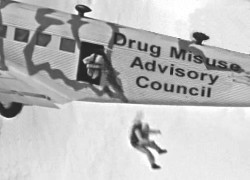 Unlike the well-fed DoH poodles at the RCP kennels, the unpaid members of the UK’s Advisory Council of the Misuse of Drugs (ACMD) have shown commendable backbone is standing up to the bullying ways of Home Secretary Alan ‘Hadron Collider’ Johnson. Indeed, so many advisors have now bailed out of the Advisory Council that the media, never strong on numbers at the best of times, have lost count of how many have jumped. It could be seven; or it might be eight. The latest expert to don his ’chute and jump is one Eric Carlin, citing undue political and media influence on the Council’s work.
Unlike the well-fed DoH poodles at the RCP kennels, the unpaid members of the UK’s Advisory Council of the Misuse of Drugs (ACMD) have shown commendable backbone is standing up to the bullying ways of Home Secretary Alan ‘Hadron Collider’ Johnson. Indeed, so many advisors have now bailed out of the Advisory Council that the media, never strong on numbers at the best of times, have lost count of how many have jumped. It could be seven; or it might be eight. The latest expert to don his ’chute and jump is one Eric Carlin, citing undue political and media influence on the Council’s work.
Hadron’s combative approach has its roots Mrs Hacksaw’s infamous 1989 ‘advisors advise, ministers decide’ retort to the then Labour leader Neil Kinnock’s charge that advisors, not ministers, were deciding economic policy. Hacksaw was asserting her prime ministerial autonomy over a friendly adviser – even if she lost her chancellor, Nigel – now Lord – Lawson, who resigned in the fallout – but the principle remains the same today – advisers, be they friend or foe, merely advise, while the serious business of deciding is done by ministers.
On the face of it, ministerial autonomy seems fair enough – as far as it goes. But there is disingenuity in Hadron’s claims, for while it is true that these advisors are indeed advisors, they are not regular advisors, but expert advisors. They know – unlike the minister – what they are talking about; and what we are seeing is not so much a clash between mere adviser and minister, as a clash between informed science, and ministerial politlicisation in a bid to gain the popular vote.
Or so the mainstream media would have us believe. But Dr No is not so sure it is as simple as a clash between red-top politics and informed science. Carlin’s resignation letter has been put online by the BBC, and so may get wide coverage, but google also reveals Carlin’s personal blog post about his resignation. It makes interesting reading – and suggests that ACMD may no longer be the beacon light of scientific advice it surely once was.
Carlin’s charge is that ACMD, in considering mephedrone, ducked the real question of drug harm and its reduction, and hid behind some fancy chemistry linking mephedrone to amphetamine, enabling Hadron to place the drug in Class B, and so ban it, a process that left Carlin ‘deeply concerned, intellectually insulted and morally compromised’.
Carlin’s post clearly show him to be on the side of decrimminalising drugs, and shifting the focus to health. Be that as it may, what worries Dr No is ACMD’s apparent shift towards satisfying ministerial imperatives. It certainly appears to worry Professor Nutt, the ex-Chair of ACMD sacked by Hadron last October. Last September, Dr No posted on the Survival of the Conformist. Could it be that, in a similar vein, it is the independent minds that have bailed out of the Advisory Council, leaving yet another weak and feeble Council of poodles, ready and willing to do the minister’s bidding?
